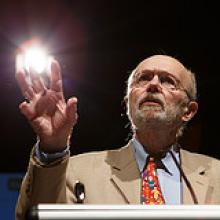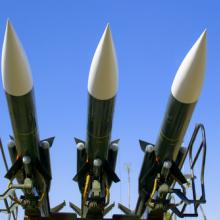just war
DON'T LET THE prestigious academic publisher put you off: The Violence of Climate Change is engagingly informative as it fuses theory and praxis through the narratives of inspirational nonviolent activists. Nor is it satisfied with the ideal, as it honestly and realistically engages current counterarguments and positions throughout. As such, it’s exceptionally suitable for undergraduates, who are often surprised, then pleased, to discover religion and theology’s relevance for addressing urgent ethical issues.
And what could be more pressing and threatening today than violence—in our city streets and between or within other nations, especially the growing possibility of nuclear war—and climate change? So I hope this book also finds its way to Sunday schools, adult religious education sessions, book club meetings, or pretty much anyone involved in the climate justice movement.
Author Kevin J. O’Brien, dean of humanities and associate professor of Christian ethics at Pacific Lutheran University, defines the problem of climate change as also a problem of structural violence, caused primarily by privileged, powerful nations, corporations, and individuals through simple decisions and complex systems over the generations. Those least responsible are also the most vulnerable and more detrimentally impacted.

thaikrit / Shutterstock
THIS SPRING, the Vatican hosted a historic convocation focused on what Pope Francis called “the active witness of nonviolence as a ‘weapon’ to achieve peace.”
Eighty participants from around the world told striking, at times heroic, stories of nonviolent peacemaking at the Rome gathering, convened by the Catholic peace movement Pax Christi International and the Vatican’s justice and peace office.
Many of them arrived directly from situations where they are mediating between violent factions using pragmatic nonviolence fueled by Christian faith—as in Uganda, Iraq, Colombia, and Mexico. Others are engaged in nonviolent peacebuilding in regions recovering from traumatic violence—as in Sri Lanka, Kenya, and the Philippines. Some are active in unarmed civilian accompaniment, shielding people under threat of violence—as in Palestine, Syria, and South Sudan. Theologians, ethicists, and international policy negotiators contributed broader context to the situational experiences.
The conversation focused on four key questions: 1) What can we learn from experiences of nonviolence as a spiritual commitment of faith and a practical strategy in violent situations across cultural contexts? 2) How do recent experiences of active nonviolence help illuminate Jesus’ way of nonviolence and engaging conflict? 3) What are the theological developments on just peace and how do they build on the scriptures and the trajectory of Catholic social thought? 4) What are key elements of an ethical framework for engaging acute conflict and addressing the “responsibility to protect” rooted in the theology and practices of nonviolent conflict transformation, nonviolent intervention, and just peace?
The convocation concluded with an astonishing document, presented to Pope Francis, titled “An appeal to the Catholic Church to recommit to the centrality of gospel nonviolence.” Recommendations included a request for a papal encyclical calling Christians to return to their fundamental vocation of nonviolent peacemaking. That means rejecting just war theory as the “settled teaching” of the church and replacing it with Jesus’ life and teaching as the foremost guide.

Photo via Wikimedia Commons
The German pastor was executed by the Nazi regime at Flossenbürg concentration camp on April 9, 1945, just two weeks before the United States liberated the camp. When he died he famously remarked to another prisoner, "This is the end — but for me, the beginning."
Since June 18, 2004, the first day U.S. drones killed people in what has been called the U.S. “global war on terror,” people of faith have questioned whether the use of lethal drones is justifiable.
Since then, the CIA has conducted an estimated 400 or more drone strikes in Pakistan, Yemen and Somalia. Drone strikes are continuing in Syria and Iraq. Hundreds of civilians have been killed, according to the Bureau of Investigative Journalism, including women and children.
These “targeted” killings are conducted remotely in countries against which we have not declared war. Lethal drone strikes occur without warning, target for death specific individuals who are secretly selected, and are operated remotely by individuals thousands of miles away.
The U.S. religious community questions the morality of such drone warfare.
Many people of faith who are not pacifists adhere to the “Just War” tradition as enshrined in international law, which assumes that war is always an evil, but that sometimes there is a greater evil that requires military force.
A coalition of more than 50 religious leaders, led by mostly conservative Catholic, evangelical, and Jewish activists, is calling on President Obama to sharply escalate military action against Islamic extremists in Iraq. They say “nothing short of the destruction” of the Islamic State can protect Christians and religious minorities now being subjected to “a campaign of genocide.”
“We represent various religious traditions and shades of belief,” the petition reads. “None of us glorifies war or underestimates the risks entailed by the use of military force.”
But they say the situation is so dire that relief for these religious communities “cannot be achieved apart from the use of military force to degrade and disable” the Islamic State forces.
The petition was organized by Robert P. George, a prominent Catholic conservative and Republican activist, and he was joined by a range of other leaders, many of whom are known for their hawkish views on foreign policy.
Editor's Note: This piece originally appeared at ABPNews/Herald HERE.
My friend Glen Stassen died today (Saturday, April 26) in Pasadena. He was 78. But because he was born on Leap Day — February 29, 1936 — Glen liked to joke that he was only 19. Until an aggressive cancer took his vitality over the last year, and finally his life, Glen as 78-going-on-19 was totally believable. It is impossible to believe that he has gone to be with Jesus.
There are only a small number of people beyond family who deeply affect the course of one’s life. Glen Stassen was one such person for me, perhaps the primary person outside my family who shaped who I am and what I have become. Having him gone makes me feel like an orphan.
Iranians tend to trust religion far more than they do politics. Accordingly, it could be helpful to formulate a potentially helpful Track Two initiative around Iran’s openness to religion as a precursor to discussing important secular issues. One possibility that comes to mind, especially if the current negotiations lead to further openness, is what one might call a “peace game.” Since Iran has been the focus of any number of war games, this would represent a peacemaking counterpart. However, rather than a scenario-driven exercise as most war games tend to be, a peace game would be more akin to facilitated brainstorming.
The basic concept would call for bringing participants from Iran and the United States together for a week to discuss what the Iranians proposed earlier, i.e. how to overcome the obstacles that stand in the way of a cooperative relationship. Participants for the game would be chosen from the ranks of respected religious, political, academic, and professional figures who (1) are not in government, (2) are known to be spiritually minded, and (3) have views that would command serious consideration by their respective governments. A religious framework for the discussions would be established at the outset, a world-class expert on negotiations would facilitate the “game,” and the final recommendations would be presented to both governments for appropriate consideration.
Even as the world’s powers grasped for a last-minute resolution to the crisis in Syria, it remained an open question whether any amount of diplomacy could prevent the conflict from claiming at least one more victim: the classic Christian teaching known as the “just war” tradition.
The central problem is not that the just war doctrine is being dismissed or condemned, but that it is loved too much. Indeed, both sides in the debate over punishing the Syrian regime for using chemical weapons are citing just war theory, but are reaching diametrically opposed conclusions.
There’s a catch phrase that comes to the fore when people start looking for religious reasons not to enter a war like the one now raging in Syria: “Who would Jesus bomb?”
Jesus would not have bombed anyone, of course. Bombs were not weapons of choice in his day. But the cruelty of war was no stranger to his era. The Romans could be every bit as cruel as Syria’s Bashar al-Assad. They executed dissidents like Jesus himself with ease. They leveled the city of Jerusalem.
But if it is hard to imagine Jesus targeting a cruise missile aimed at another nation, it is not hard to imaging him encouraging his followers to stand with those who are most vulnerable, to seek ways to defend others from cruelty, to come to the aid of those refugees displaced by war. The question is how best to do that.
As I began my morning devotions on Tuesday this week, Syria was on my mind. No surprise, right? The debate about whether to respond militarily to the use of chemical weapons is all over the news right now. Mostly folks are arguing about what actually happened and the larger geopolitical questions that a military strike involves, which are important and necessary issues. But here’s the question that was rattling around in my head as I turned to the day’s devotional readings on universalis.com: How does one respond to violence without becoming as guilty as the perpetrators you seek to punish?
As the Obama administration readies for a probable military strike against Syria, Religion News Service asked a panel of theologians and policy experts whether the U.S. should intervene in Syria in light of the regime’s use of chemical weapons against civilians. Would the “Just War” doctrine justify U.S. military action, and what is America’s moral responsibility? Here are their responses, which have been edited for clarity.
ON THE AFTERNOON of Dec. 14, President Obama stood in the White House press room, tears in his eyes, and spoke for many Americans who had watched the terrifying events unfolding in Newtown, Conn.
“I know there’s not a parent in America who doesn’t feel the same overwhelming grief that I do. The majority of those who died today were children: beautiful little kids between the ages of 5 and 10 years old,” he said. “They had their entire lives ahead of them—birthdays, graduations, weddings, kids of their own.”
A little more than a month later, on Jan. 23, a pilotless aircraft owned and operated by the United States and controlled remotely by an individual on U.S. soil launched a targeted attack on the riders of two motorcycles in Yemen. The attack missed its target. It hit the house of Abdu Mohammed al-Jarrah instead, killing several people—including al-Jarrah’s two children.
There was no press conference for the al-Jarrah children.
It was President Obama himself, in fact, after his inauguration in 2009, who authorized an expansion of the U.S. drone program launched under George W. Bush. The “Authorization for Use of Military Force,” passed shortly after Sept. 11, gives the president broad authority to use force against those involved in the 9/11 attacks or those who harbor them. Drones have become President Obama’s weapon of choice.
SOME CHRISTIANS seeking moral guidance about drone warfare find enough clear teaching in Jesus’ command to love our enemies and respond to conflict with principled, active nonviolence. Other Christian traditions, seeking to restrict and limit warfare, have developed principles of “just war,” which deem certain acts of war immoral and illegitimate. Targeted killings by drones, which have become key elements of the Obama administration’s counterterrorism strategy, fail the test of morality on a number of grounds:
1. Targeted assassinations outside of legally declared wars violate international law, which prohibits a country from carrying out military attacks in or against the territory of countries with which it is not at war. Drone attacks in Pakistan, Yemen, and Somalia violate this prohibition.
2. They violate the sovereignty of other countries. The government of Pakistan has repeatedly objected to drone strikes on its territory, calling them a “clear violation of our sovereignty and a violation of international law,” but its concerns have been repeatedly ignored.
3. There is little transparency or accountability. CIA drones are remotely controlled, primarily from Air Force bases in the United States, with no clear accountability, and with the targeting sometimes based on dubious intelligence.
In a letter sent to the White House and the leadership of key Congressional committees, Bishop Richard E. Pates of Des Moines, Iowa, chair of the U.S. Catholic Bishops’ Committee on International Justice and Peace, wrote that the use of drones in counter-terrorism “raises serious moral questions.”
Even when viewed through the prism of just war principles, the use of unmanned aerial vehicles (UAVs) for targeted killings raises serious moral questions. The Administration seems to have focused narrowly on the just cause of protecting citizens, but other elements of the tradition pose significant questions, including discrimination, imminence of the threat, proportionality and probability of success. Targeted killing should, by definition, be highly discriminatory. The Administration's policy appears to extend the use of deadly force to alleged "signature" attacks and reportedly classifies all males of a certain age as combatants. Are these policies morally defensible? They seem to violate the law of war, international human rights law, and moral norms.
He concludes by asking:
We understand the necessity for operational secrecy in counter-terrorism, but isn’t it critical to have a public discussion of the terms of the Administration’s policy of employing drones for targeted killings? Don’t the moral and strategic issues involved require broader discussion? Shouldn’t a policy with such wide potential consequences be subject to public scrutiny, at a minimum by representative institutions in a democratic society?
Read more here.
John McCain angrily insisted on “right” and “wrong” answers to his questions of Chuck Hagel yesterday. As a theologian and a religious leader, I want to say that John McCain is “wrong.”
I watched the hostile questions that Sen. McCain asked Hagel in the hearings on his nomination for Secretary of Defense. The angry attacks from McCain were about the Iraq War, for which McCain was one of America’s leading advocates. Hagel had previously called the war in Iraq the biggest American foreign policy mistake since Vietnam. Obviously furious, McCain tried to force Hagel to say the last “surge” in Iraq, which McCain had made his cause, was right after all. Despite the aggressive and disrespectful questioning from his former “friend,” Hagel wouldn’t submit to McCain’s demands and said these questions would be subject to history — and to theological morality, to which John McCain has never submitted his views. In fact, his repeated desire to invade other people’s countries is offensive moral hubris.
Finally, as President Obama has announced, this American war will soon be over, with most of the 44,000 American troops still in Iraq coming home in time to be with their families for Christmas.
The initial feelings that rushed over me after hearing the White House announcement were of deep relief. But then they turned to deep sadness over the terrible cost of a war that was, from the beginning, wrong; intellectually, politically, strategically and, above all, morally wrong.
The War in Iraq was fundamentally a war of choice, and it was the wrong choice.
I hate war. I do not hate it because people die. Death is inescapable. And believers believe that we will meet those we love again in heaven. I hate war with a perfect hatred because it causes suffering and robs the world of incalculable human possibilities. It pains the earth. It creates waste and the misallocation of resources.
Saturday, August 6, 30 Americans and eight Afghans were killed when Taliban insurgents shot down a Chinook transport helicopter. The New York Times called it: "the deadliest day for American forces in the nearly decade-long war in Afghanistan."
My friends and I can be stupid. Add explosives to the equation and the idiocy quotient increases exponentially. Such was the case every 4th of July during high school. A group of about 20 of my friends and I would get together to barbecue and play with illegal fireworks. At any unsuspected moment while taking a bite out of a burger, an M-80 could be lit under your seat, a sparkler thrown at your chest like a dart, or a mortar could be shot like a bazooka, catching bushes on fire. These chaotically stupid memories simultaneously serve as some of the most fun I can recall experiencing. So for me, Independence Day equals fun.
However, there's a deeper reality to this holiday. Only about three years ago did I realize that in celebrating Independence Day, I'm also glorifying the roots on which this nation was founded: an unjust war. The "rockets red glare" and "the bombs bursting in air" remind us not of the day God liberated the colonies, but of the moment in history when our forefathers stole the rhetoric of God from authentic Christianity to justify killing fellow Christians. There's two reasons I'm convinced that celebrating Independence Day celebrates an unjust war.
You have to wonder -- when political ads focus on a college prank pulled by your opponent -- what else could that money have gone to?
This is the second installment of a series Logan Mehl-Laituri is writing for God's Politics focusing on selective conscientious objection. Read his first installment here.







![Pope Gregory the Great, Carlo Saraceni [Public domain], via Wikimedia Commons Pope Gregory the Great, Carlo Saraceni [Public domain], via Wikimedia Commons](https://sojo.net/sites/default/files/styles/medium_square/public/blog/Gregorythegreat.jpg?itok=5WShJkFj)



